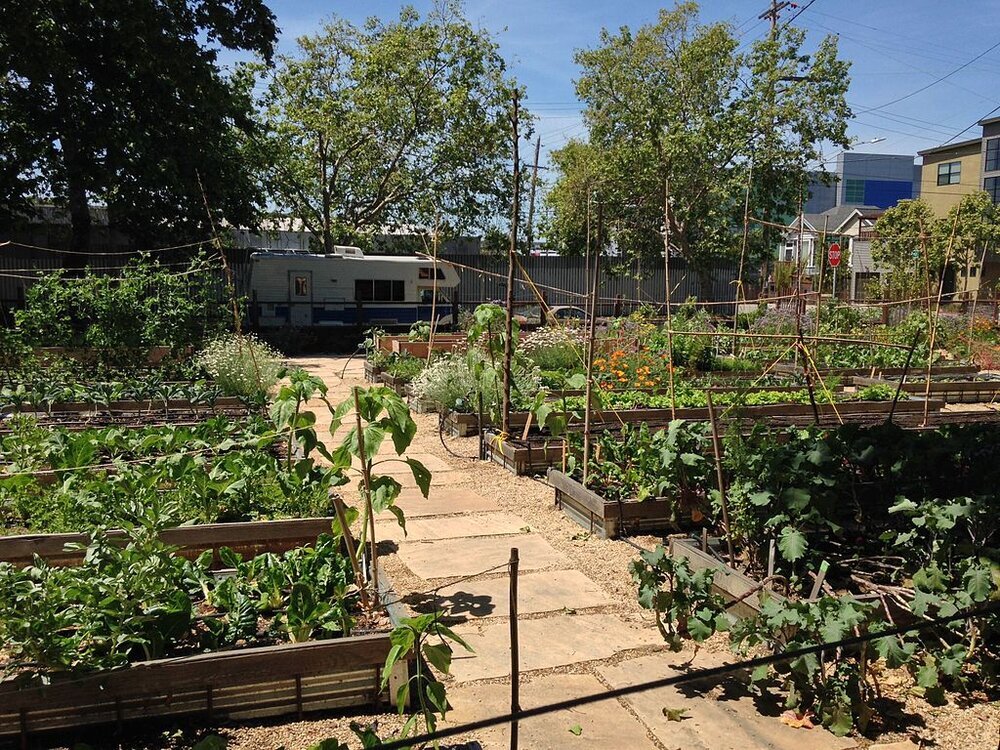The Economic and Social Benefits of Urban Agriculture
Photo Credit © S an Editor on Wikimedia Commons; (see license); no changes were made.
Urban agriculture has never been more popular. In developing countries, it’s a way to fight food insecurity and generate extra income for families. In the US, small rooftop gardens provide homegrown produce for residents of areas with inner-city food deserts.
However, urban agriculture does much more than provide food resources for the hungry. Around the world, this practice is an easy way to encourage positive economic and social change in local communities.
Economic Benefits
The main economic benefit of urban agriculture is as a local resource for consumers. Urban gardens don’t require a complex network for distribution, which means farmers can stay connected to their market and faster adapt to the demands of the consumer [FN1]. This high level of responsiveness helps them maximize profit and stimulate the local economy.
Urban gardens are also a great way to re-purpose unused land for profitable, local projects. One such organization, called “Food from the Hood”, turned an abandoned football field in Los Angeles into a farm where 25% of the proceeds went to a youth scholarship fund [FN2].
In many areas, urban agriculture has become a catalyst for economic development and tourism by attracting businesses and residents. Research shows that expanding urban agriculture increases both desirability and value of local property, which in turn stimulates the economy through increased commercial and residential interest in these areas [FN3].
Social Benefits
One of the biggest and most prolific social benefits of urban farming is its ability to change the nature of a space, and thus positively alter the dynamic of a neighborhood.
In many large cities, such as Detroit and New York City, vacant lots and unused urban areas become hotbeds for crime and drug abuse. Transforming these areas into urban farms and gardens can help change the dynamic of the neighborhood for the better.
For example, one study found that the agricultural re-purposing of vacant urban spaces directly increased property values in less desirable, higher crime neighborhoods [FN4]. The addition of farms and gardens provides a productive, community-building activity for residents, and people who spend their time cultivating urban gardens and farms are more reluctant to commit crime [FN5]. Gardens are also more aesthetically pleasing than vacant lots, foster an increased sense of community and connection, and provide educational opportunities for local children – all of which further contribute to the increase in property value [FN6].
How Urban Gardens Have Helped Detroit
Detroit is a prime example of the positive impact that urban agriculture can have on communities. As compared to other large cities in the US, it has one of the most successful and established urban agriculture presences. Their Keep Growing Detroit program has positively impacted many local communities.
Keep Growing Detroit promotes urban agriculture as both a solution to local food insecurity and a way to improve quality of life for lower-income Detroit residents. In 2019, the program helped 25,491 residents in Detroit, Hamtramck, and Highland Park start gardens to feed themselves and their communities. They also hosted 80 educational events to support new and innovative growers [FN7].
Economic and social benefits are often intertwined and, interestingly, the social and economic benefits of urban farms in developed areas often overshadow their ability to combat food insecurity [FN8]. As urban farms and gardens increase the values of properties and neighborhoods, the local economy often improves [FN9]. Meanwhile, replacing vacant lots with productive green space improves neighborhood aesthetics, decreases crime and reduces drug abuse. Expanding urban agriculture not only helps counteract the negative effects of urban sprawl and farmland destruction, but also provides myriad economic and social benefits to cities and their residents.
Resources
1. https://www.theecologycenter.org/10-ways-urban-farms-benefit-the-community/
3. https://www.tehrantimes.com/news/438142/Ecological-Social-and-Economic-Benefits-of-Urban-Agriculture
4. https://www.vox.com/2016/5/15/11660304/urban-farming-benefits
5. https://www.tehrantimes.com/news/438142/Ecological-Social-and-Economic-Benefits-of-Urban-Agriculture
6. https://www.pps.org/article/beyond-food-community-gardens-as-places-of-connection-and-empowerment
7. http://detroitagriculture.net/wp-content/uploads/2019_KGD_Annual-Report_Final_Small.pdf

